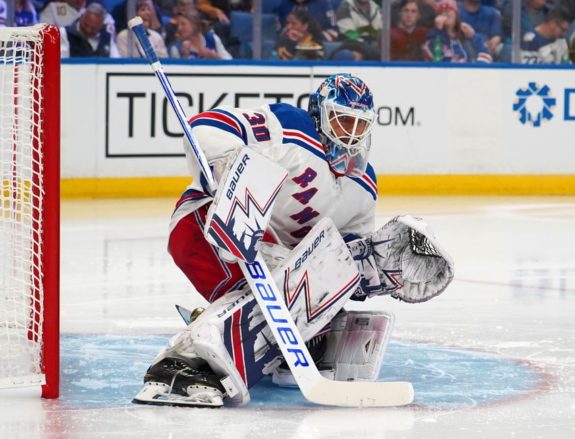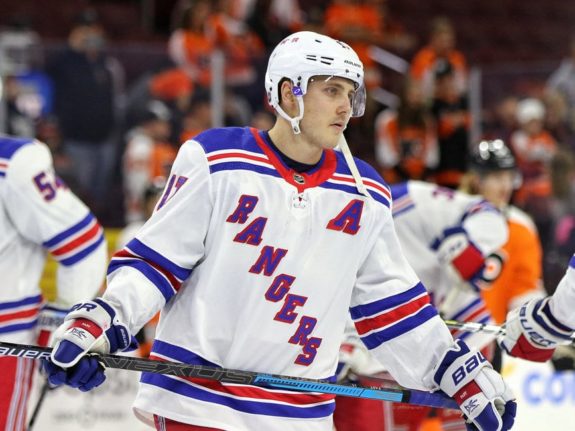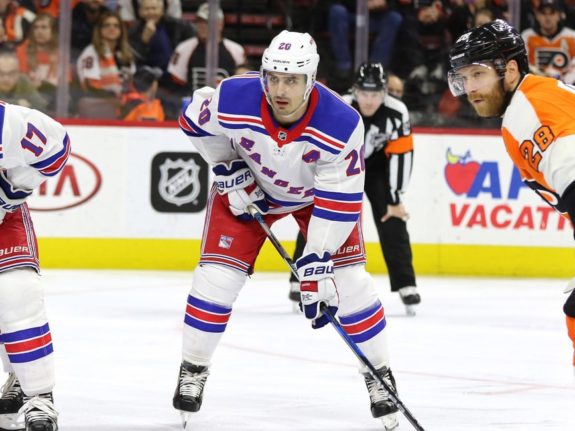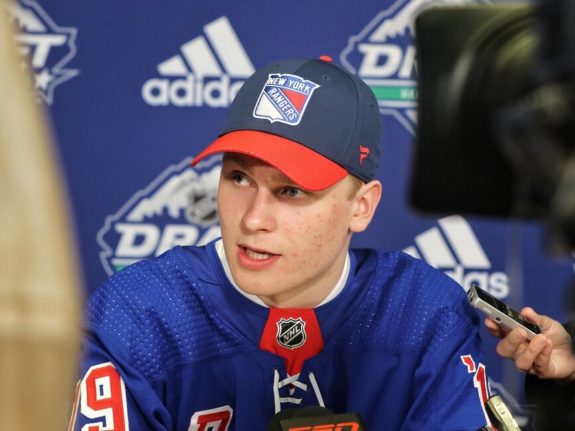With a crop of high-end prospects, along with acquisitions made through trade and free agency, the New York Rangers have taken their slow rebuild and accelerated the process in a few short months.
A few of those prospects include Kaapo Kakko, Vitali Kravtzov, K’Andre Miller, Adam Fox, Nils Lundkvist, Yegor Rykov, Libor Hajek, and Igor Shestyorkin. Besides the two Americans, Miller and Fox, the remaining names are all Europeans. Who better to mentor these young minds than a few veteran Europeans: Henrik Lundqvist and Jesper Fast. The common thread linking these two players is the work ethic they needed to get into the NHL.

Henrik Lundqvist (Kevin Hoffman-USA TODAY Sports) 
Jesper Fast (Amy Irvin / The Hockey Writers)
More importantly, it was their determination to keep their jobs, as both were late-round draft picks; Lundqvist, a seventh-rounder, and Fast, a sixth-rounder. Late-round draft picks do not always get the same chance to make an impression that early-round picks do. Sharing their journey and knowledge of the ins and outs of the league will be a crucial aspect in taking this group of Rangers prospects and converting them into NHL professionals.
Henrik Lundqvist
Lundqvist was drafted 205th overall in the 2000 Draft by the Rangers. After playing five seasons in the Swedish Elite League for Frölunda HC, he joined the Rangers in the 2005-06 season and was spectacular. His Mr. Fantastic-like stretching pad saves were something Rangers fans had not seen since Mike Richter. His glove hand was a flash of Martin Brodeur and his most electrifying skill was the “big save at the right time” style, which mimicked a dash of Dominic Hasek, Lundqvist’s role model growing up in Sweden. Rangers fans found their diamond in the rough and nicknamed him, “King Henrik,” a name he goes by to this day.
He took over the reins in his first season and has been the Rangers’ starting goaltender ever since. The 2012 Vezina Trophy winner has dealt with adversity, but what differentiates him from other goalies who ultimately fade into oblivion and become trivia questions, is his comparable competitiveness to Sidney Crosby, one of the best players in the world. When Lundqvist’s play is criticized, the Swede has been known to stay after practice and work to correct the flaw. His offseason training has always been vigorous and he doesn’t seem satisfied until a negative attribute is gone. His diligence is synonymous with his success and is the reason for the superstar title he currently holds.
There is a reason why he was nominated three times before winning the Vezina Trophy in 2012 and why he became the first goaltender to record 11 30-win seasons in his first 12 seasons. Did I mention he holds the record for the most wins by a European-born goaltender? Lundqvist is special, but these accolades would never have come without the hard work he puts into his trade.
Jesper Fast
Let’s move to Lundqvist’s fellow countryman and teammate, Jesper Fast. Fast is in his sixth season with the Rangers and has become a staple in the bottom-six, donning an ‘A’ on his sweater as a result of his tenure and hard work. He didn’t have the explosive introduction that Lundqvist had in his first NHL season. Instead, he split time between the Hartford Wolf Pack in the AHL and the Rangers in his first two years in North America.
In the 2014-15 season, Fast made his mark as an NHLer when he played in 19 playoff games, recording six points. Since that playoff run, he has not seen a day in the minors. He is viewed as a speedy, skilled player who is a pest on the forecheck. Exploiting chaos, he ultimately breaks up a play and has the hockey sense to generate offense to change the momentum of a shift. He is extremely reliable in the defensive end and is a huge part of the Rangers’ penalty kill.
Fast, in my opinion, is an above-average role player, who has worked hard to stay in the lineup and become the player he is today. In prior years, the
The Mental Side of the Game
A lot of pressure comes with bearing the title of “first-round pick.” Luckily, the Rangers have a few players on their roster who were drafted early: Mika Zibanjead, Chris Kreider, Marc Staal, and Brady Skjei. Managing mental exhaustion from an NHL season is hard enough, but when
Unfortunately, he takes a lot of heat due to his high ceiling. Many have grown impatient for a potential “break out” even though he plays well in the system used by the Rangers. This includes applying pressure to defensemen, although generating points seems to be everything to critics. So, a player of his caliber is bound to catch a few questions about point totals.

So many young stars burn out early due to this pressure of immediate contribution. Reacting to a rough patch early in a career can be taught through support from a veteran core that has been through the wringer. Veterans have been in this exact spotlight before and know how to handle the situation. If one of the young guys has a rough night, a veteran may step in for an interview rather than have the youngster bombarded with ego-deflating questions.
Moving Forward
The future is bright for the Rangers and these young prospects have a heavy workload ahead of them. Fighting in training camp to make the opening night roster this season is number one. General manager, Jeff Gorton, has stressed that roster spots are available. A scary, but a good point is management has a lot to keep an eye out for as there are top prospects in every position and a lot of them. This should be motivation in itself to make the team.

For those who make the NHL squad, they are in good hands. With Lundqvist, Fast, and the group of veterans acting as mentors and role models, I have a feeling these mesmerizing players are going to flourish in this environment. They have the skill to prosper and the mental support to push through the grind. All these young men need to do is to learn to not only listen to their teammates but management as well. The tools are already there. Now the hard work begins.